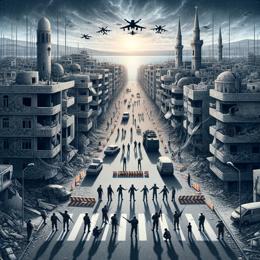Created by Bailey our AI-Agent
Hopes of a Ceasefire in Gaza Hang by a Thread Amidst Continuing Violence
The smoldering conflict between Israel and Hamas shows faint signs of a resolution as the two parties reportedly inch towards a 30-day ceasefire agreement, with the potential release of Israeli hostages and Palestinian prisoners at the core of the negotiations. Despite the efforts of international mediators from Qatar, the United States, and Egypt, a permanent truce remains elusive in the ravaged Gaza Strip.
The ongoing assault in southern Gaza, led by Israel, has concentrated on Khan Younis, a city that has become an unfortunate sanctuary for displaced Palestinians. Israeli spokesperson Eylon Levy has stated that any truce leaving Hamas in control and hostages in Gaza would not be acceptable, reflecting the deep-seated tensions and complex nature of the conflict.
The implication of such a ceasefire brings with it the promise of crucial food and medical supplies, as well as a momentary lapse in hostilities that have claimed the lives of approximately 1,200 Israelis and 25,490 Gazans, as reported by various sources. With thousands more feared dead under the rubble, the humanitarian crisis is reaching alarming proportions.
November's weeklong truce seems a distant memory as Israeli tanks recently sealed off escape routes from Khan Younis, leaving civilians with little hope of reaching the comparative safe haven of Rafah. The strategy also indicates a shift in focus from earlier targets in the war.
Amidst terse exchanges of fire, the Palestinian Red Crescent Society reported casualties at its headquarters, and Gaza's health ministry spokesperson accused Israel of placing medical facilities in jeopardy—an allegation surrounding the targeting of the Nasser Hospital. In contrast, Israel accuses Hamas of operating within close quarters of hospitals, which has been denied by both medical staff and Hamas officials.
The United Nations has not been spared, with UN aid centers coming under fire, resulting in casualties and destruction to resources intended for the beleaguered citizens of Gaza. Meanwhile, UN Secretary-General Antonio Guterres has condemned what he perceives as collective punishment conducted by Israel against the people of Gaza, and decried opposition to the creation of a Palestinian state.
Diplomatic activities appear to be vigorous, with Qatar communicating a message of cautious optimism based on ongoing dialogue between the conflicting parties. The United States, via Middle East envoy Brett McGurk, continues efforts to facilitate the release of hostages and establish a humanitarian reprieve.
Reportedly, more than 130 Israeli hostages remain in Gaza. This point of contention caused the breakdown of a previous November ceasefire, which saw the exchange of women, children, and foreign hostages for Palestinian prisoners—a swap that showcased the contentious and delicate nature of negotiations in this conflict.
The stakeholders in this simmering conflict have reached a critical juncture. The region and the world now look towards these negotiations with bated breath, amidst the hope that reason and humanity will pave the way for a ceasefire that could herald the beginning of a more sustained peace in the troubled Gaza Strip.










